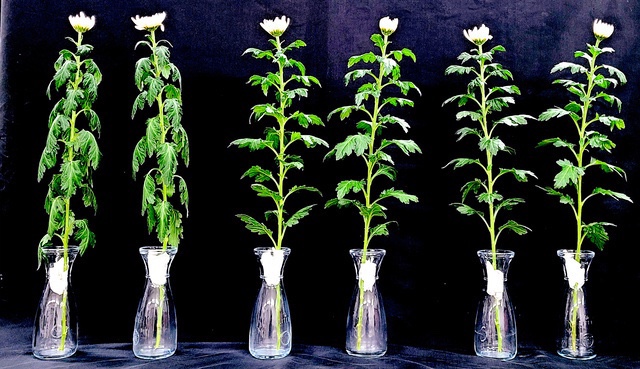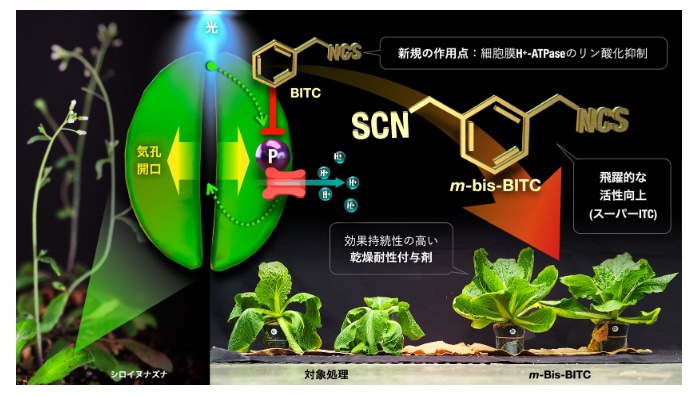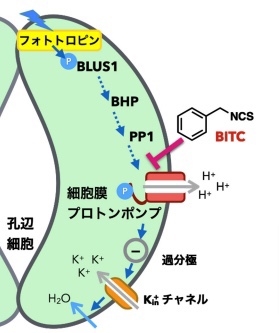
1.5 hours after draining the water from cut chrysanthemums.
BITC (3, 4) and Super ITC (5, 6) are applied compared to untreated (1, 2 from the left). Photo courtesy of Nagoya University (Asahi Shimbun)
Wasabi spiciness component: Maintains the freshness of vegetables!
– Used to keep leafy vegetables and cut flowers fresh –
Nagoya University and Kwansei Gakuin University:
We focused on the “stomata for moisture and gas exchange” in the epidermis of plant leaves.
I found a natural substance that prevents the opening of “stomata”.
It is one of the pungent components of wasabi, etc., and is used to preserve the freshness of leafy vegetables and cut flowers.
(Asahi Shimbun Digital)-Yahoo! News
https://news.yahoo.co.jp/articles/db7946bf5144d968c0eab216139f0c060bb9c020

24 hours after draining water from potted Chinese cabbage.
Compared to the two on the left, the Chinese cabbages coated with Super ITC (the two on the right) had significantly less wilting. (Photo courtesy of Nagoya University)

Newly discovered natural product that prevents wilting of plants!
~The true identity is the pungent component, which can be used for a wide range of applications through molecular modification~
Institute of Biomolecular Science, Nagoya University: Faculty of Science, Kwansei Gakuin University
We discovered a natural substance that suppresses stomatal opening in plants, and succeeded in developing a molecule that greatly improved plant activity.
Inhibits leaf wilting due to desiccation:
When the compound was sprayed on cut flowers of chrysanthemums and Chinese cabbage planted in soil, it was found that “withering of leaves due to drying is suppressed.”
Drought Tolerant for Agricultural Crops:
It is expected to be used as a freshness-preserving agent for cut flowers and flower arrangements and as a drought-tolerant agent for agricultural products.
Research results:
Published online May 15, 2023 in Nature Communications.
Discovery of stomatal opening inhibitors:
We discovered benzyl isothiocyanate (BITC), a natural product contained in rapeseed, as a stomatal opening inhibitor.
It was found that this compound inhibits the “function of the stomata opening engine/cell membrane proton pump” and prevents stomata from opening.
Japanese research dot com
https://research-er.jp/articles/view/122036

Identification and improvement of isothiocyanate-based inhibitors on stomatal opening to act as drought tolerance-conferring agrochemicals
Nature Communications
Abstract
Stomatal pores in the plant epidermis open and close to regulate gas exchange between leaves and the atmosphere.
Upon light stimulation, the plasma membrane (PM) H+-ATPase is phosphorylated and activated via an intracellular signal transduction pathway in stomatal guard cells, providing a primary driving force for the opening movement.
To uncover and manipulate this stomatal opening pathway, we screened a chemical library and identified benzyl isothiocyanate (BITC), a Brassicales-specific metabolite, as a potent stomatal-opening inhibitor that suppresses PM H+-ATPase phosphorylation.
We further developed BITC derivatives with multiple isothiocyanate groups (multi-ITCs), which demonstrate inhibitory activity on stomatal opening up to 66 times stronger, as well as a longer duration of the effect and negligible toxicity.
The multi-ITC treatment inhibits plant leaf wilting in both short (1.5 h) and long-term (24 h) periods. Our research elucidates the biological function of BITC and its use as an agrochemical that confers drought tolerance on plants by suppressing stomatal opening.